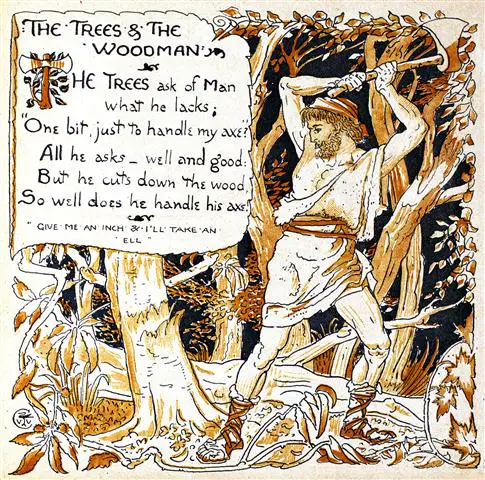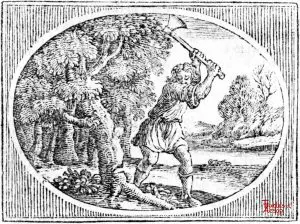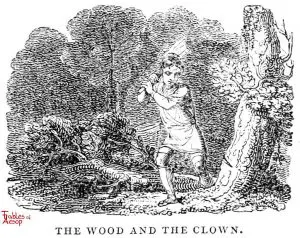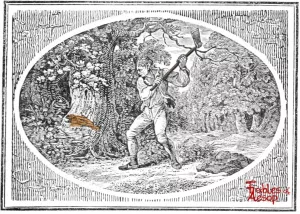The trees willingly give a woodsman a shaft for his axe. Ooops, too bad.
Nothing bothers a man more than to see he has aided his own undoing.

Eliot/Jacobs Version
A Man came into a Wood one day with an axe in his hand, and begged all the Trees to give him a small branch which he wanted for a particular purpose. The Trees were good-natured and gave him one of their branches. What did the Man do but fix it into the axe head, and soon set to work cutting down tree after tree. Then the Trees saw how foolish they had been in giving their enemy the means of destroying themselves.

Townsend version
A man came into a forest and asked the Trees to provide him a handle for his axe. The Trees consented to his request and gave him a young ash-tree. No sooner had the man fitted a new handle to his axe from it, than he began to use it and quickly felled with his strokes the noblest giants of the forest. An old oak, lamenting when too late the destruction of his companions, said to a neighboring cedar, “The first step has lost us all. If we had not given up the rights of the ash, we might yet have retained our own privileges and have stood for ages.”

Samuel Croxall (The Wood and the Clown)
A COUNTRY fellow came one day into the wood, and looked about him with some concern; upon which the Trees, with a curiosity natural to some other creatures, asked him what he wanted. He replied, that he only wanted a piece of wood to make a handle to his hatchet. Since that was all, it was voted unanimously that he should have a piece of good, sound, tough ash. But he had no sooner received and fitted it for his purpose, than he begun to lay about him unmercifully, and to hack and hew without distinction, felling the noblest trees in all the forest. The Oak is said to have spoken thus to the Beech, in a low whisper, Brother, we must take it for our pains.
THE APPLICATION
No people are more justly liable to suffer, than they who furnish their enemies with any kind of assistance. It is generous to forgive; it is enjoined us by religion to love our enemies; but he that trusts an enemy, much more contributes to the strengthening and arming of him, may almost depend upon repenting him for his inadvertent benevolence: and has, moreover, this to add to his distress, that when he might have prevented it, he brought his misfortunes upon himself by his own credulity.
Any person in a community, by what name or title soever distinguished, who affects a power which may possibly hurt the people, is an enemy to that people, and therefore they ought not to trust him: for though he were ever so fully determined not to abuse such a power, yet he is so far a bad man, as he disturbs the people’s quiet, and makes them jealous and uneasy, by desiring to have it, or even retaining it, when it may prove mischievous. If we consult history, we shall find that the thing called prerogative has been claimed and contended for chiefly by those who never intended to make a good use of it; and as readily resigned and thrown up by just and wise princes, who had the true interest of their people at heart. How like senseless stocks do they act, who, by complimenting some capricious mortal from time to time, with parcels of prerogative, at last put it out of their power to defend and maintain themselves in their just and natural liberty!

Thomas Bewick (The Trees and The Woodman)
A Countryman being in want of a handle for his hatchet, entered a wood and looked among the branches for one that would suit his purpose. The Trees, with a curiosity natural to some other creatures, asked him what he was seeking? He replied that he only wanted a piece of wood to make a handle to his axe, and begged they would be so good as to permit him to serve himself. Since that is all, said the Trees, help yourself, and welcome. He immediately availed himself of the permission, and had no sooner fitted up his instrument, than he began pell-mell to cut and hack about him, felling the noblest trees in all the forest, without distinction. The Oak is said to have spoke thus to the Beech, in a low whisper: Brother, we must take all this for our easy credulity, and imprudent generosity.
APPLICATION.
One would imagine that the natural principle of self-preservation implanted in us, would make it unnecessary to caution any one not to furnish an enemy with arms against himself. Yet daily experience shews us that such instances of imprudence are not uncommon. In this life we are liable to be surrounded with calamities and distresses: we should therefore be cautious of adding to our misfortunes, by our own want of caution, and of putting power into the hands of those enemies, which our merit or our affluence may tempt to rise up against us. Any person in a community, by what name or title soever distinguished, who affects a power which may possibly hurt a people, is their enemy, and therefore they ought not to trust him: for though he were ever so fully determined not to abuse such a power, yet he is so far a bad man, as he disturbs a nation’s quiet, and makes them jealous and uneasy, by desiring to have it, or even retaining it, when it may prove mischievous. If we consult history, we shall find that the thing called prerogative, has been claimed and contended for chiefly by those who never intended to make a good use of it; and as readily resigned by wise and just princes, who had the true interest of their people at heart. How like senseless stocks do they act, who, by complimenting some capricious mortal, from time to time, with scraps of prerogative, at last put it out of their power to maintain their just and natural liberty!

JBR Collection (The Wood and The Clown)
A Countryman entered a Wood and looked about him as though he were in search of something. The Trees, moved by curiosity, asked him what it was he wanted. He answered that all he wanted was a piece of good, tough ash for a handle to his axe. The Trees agreed that if that was all, he would have it. When, however, he had got it, and fitted it to his axe, he laid about him unmercifully, and the giants of the forest fell under his strokes. The Oak is said to have spoken thus to the Beech, in a low whisper: “Brother, we must take it for our pains.”

L’Estrange version
A carpenter that had got the iron-work of an axe allready, went to the next forrest to beg only so much wood as would make a handle to’t. The matter seem’d so small that the request was easily granted; but when the timber-trees came to find that the whole wood was to be cut down by the help of this handle, There’s no remedy, they cry’d, but patience, when people are undone by their own folly.
Moral
Nothing goes nearer a man in his misfortunes, then to find himself undone by his own folly, or but any way accessory to his own ruine.

Crane Poetry Visual

The Trees ask of Man what he lacks;
“One bit, just to handle my axe?”
All he asks … well and good:
But he cuts down the wood,
So well does he handle his axe.
Give me an inch & I’ll take an ell.
[Note: The Perry index links this fable with The Oaks and Jupiter.]
Perry #302


